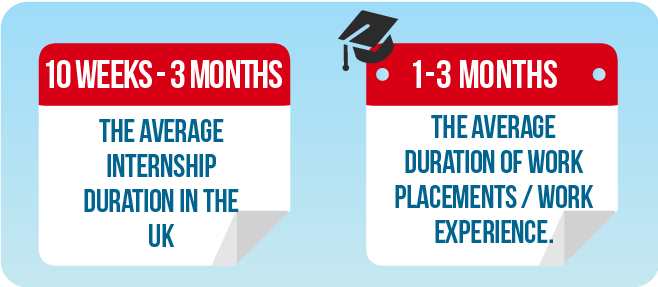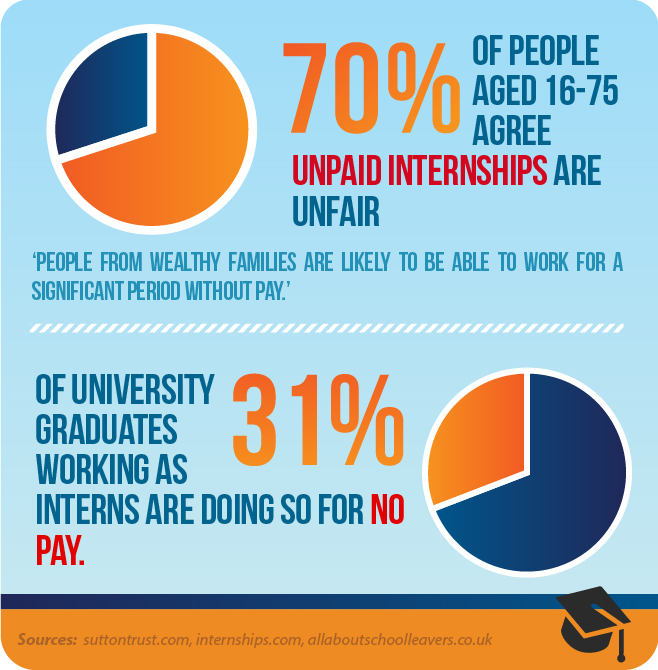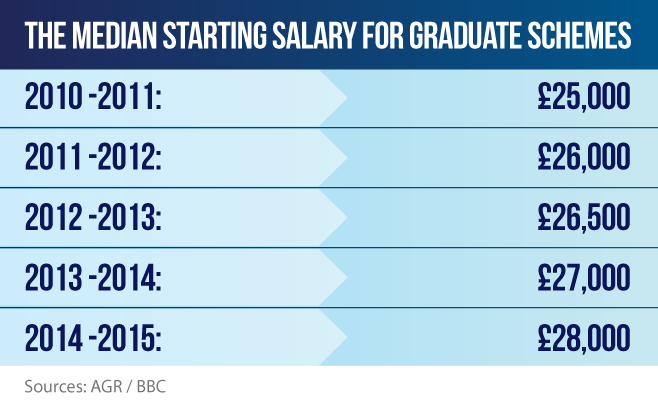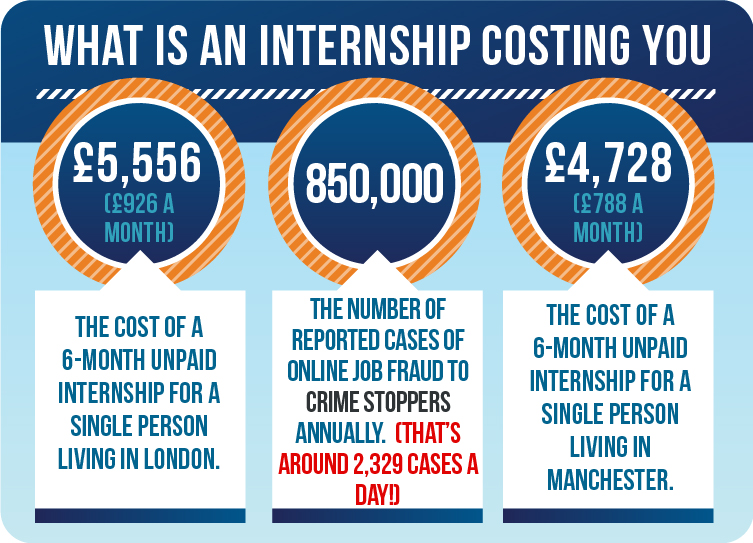The Legalities of Working For Free
Sep 28 2016
Darren Best

Online Job Fraud Statistics
According to crimestoppers-uk.org, ‘approximately 850,000 people report cases of online job fraud to Crime Stoppers annually - that’s around 2329 cases a day!
However, the current nature of the jobs market has made it difficult to distinguish the legalities surrounding job offers. Many graduates are desperate to gain experience in their desired field, and are willing to work unpaid positions in order to accomplish this.
According to suttontrust.com:
‘It estimates that there are at least 21,000 unpaid interns working in the UK at any one time.’ And ‘around 22,000 out of 70,000 people taking long-term work experience placements are currently without pay.’
When looking at the average starting salaries for a graduate, you are likely to be met with a range of answers. Professional bodies such as the AGR, will claim that modern-day graduates are set to earn in excess of £28,000 annually.
However, as noted by the Guardian:
‘Most graduates don't work in London, and most graduates don't work for these companies. The research does not represent the real-life experiences of most people who ever have, or ever will go to university. Although they are interesting, they only shed light on a certain part of the jobs market.’
‘The reality for the majority of graduates this year is that their average starting salary will be about £20,000 – even lower outside London. Most new graduates will get jobs, but not on large graduate training schemes, rather with small businesses and local firms – both public and private sector employers which are not covered by these surveys.’
To clarify the legalities of working for free; London-based commerical estate agents firm, asked a sample of working professionals about their experiences of having to work without pay and analysed their predicament from a legal point of view.
Job Title: Community Street Fundraiser, commuting Southport - Liverpool
“We were expected to report back to our central office every day for debriefing – none of our travel expenses were covered.”
Total loss: £150
Approximate cost living away from parents: £920.00
Description: Our job description described the position to “directly market to customers on a face to face basis at various venues.” In reality, once the podium had been set up, our superiors would actively encourage us to break the rules and regulations allowing us to be there. For example, after pressuring people into signing up for things, our superiors would encourage us to wander from the agreed area of podium to target more people elsewhere.
We were denied any form of break and had to work through our lunch hour. Different levels of commission were awarded based on the employee’s age. This started from £5 and the most that was given was £25 per signing. Owing to the fact I didn’t enjoy pressurising the vulnerable people we were regularly targeting, I made a grand total of nothing.
Salary: £0 (Commission of £5-25 per signing)
Hours worked: Travelling from 6am, I’d arrive at work at 7am and sent to a certain location to work until 6pm in the evening. We were then expected to return back to the office for debriefing (none of our travel expenses were paid). Following this I would travel back home, arriving at approximately 9pm.
Duration: 2-3 weeks
Legal: No.
According to ukjobsguide.co.uk,
“Employers are legally obliged to ensure you receive at least the Minimum Wage for every hour you work, though they can use commission as a means of making up this rate of pay. Commission-only jobs are perfectly legal, so long as employers respect National Minimum Wage legislation.”
Job: Magazine Editorial Intern, Elstree – commuting to London
“My parents encouraged me to take the job to gain experience and have something that stood out on my CV, saying they’d help me out financially. It’s true, if I hadn’t have worked for free, someone else would have”
Total loss: £61.60 Approximate cost living away from parents: £1441.60
Description: I was an editorial intern for a print magazine company. My role entailed writing articles, researching trends, asking PR agencies for campaign images and attending daily meetings. I was expected to work a full day.
Salary: £0 (Given £15 expenses to cover food and travel)
Hours worked: I would leave the house at 7am and arrive into Central London offices before 8.30am to start the working day. You were given an hour for lunch and I was only given £5 expenses for lunch. I had to keep all receipts with me and I was reimbursed on a weekly basis. My hours were from 9am-5pm and I would only get home by 6.30pm, sometimes 7pm, depending on the trains.
Duration: One month - I was asked to stay on, but left.
Legal: Yes
According to Gov.uk, ‘An intern is classed as a worker and is due the National Minimum Wage if they’re promised a contract of future work.’ In this case, no verbal or written contract was promised, so the individual qualified under voluntary work / unpaid internship guidelines.'
Job: Waitress, Loughborough
“I then asked what salary I would be on. They replied asking if I would not still work for free? When I replied no, they retracted their offer of a job.”
Total loss: £0 Approximate cost living away from parents: £760.00
Description: I was given a free trial for a position waitressing at a local restaurant. At the end of the two-week trial, I was given my shifts for the following week. I asked if this meant that I had gotten the job, to which they replied yes. I then asked what salary I would be on. They replied asking if I would not still work for free? When I replied no, they retracted their offer of a job. A couple of weeks later, a friend of mine also trialed at the restaurant. They did exactly the same to her. It would seem that they have a regular stream of free labour.
Salary: £0 (It was a free trial)
Hours worked: I worked shift patterns, namely 11-5pm or 3:30pm-10:30pm
Total loss: £0 – I cycled and live with my parents.
Duration: 2 weeks
Legal: Unclear
However, it is likely the decision made by the company could have been disputed by the person trialed under the following criteria:
According to Gov.uk:
The conditions for a work trial are:
- The duration of the trial must be agreed in advance
- The jobseeker must meet eligibility conditions and volunteer to take part - Jobcentre Plus will check this for you
‘You can offer a work trial if the job is for 16 hours or more a week and lasts at least 13 weeks. The work trial can last up to 30 days.’
Employers can’t avoid paying the National Minimum Wage if it’s due by:
- saying or stating that it doesn’t apply
- Making a written agreement saying someone isn’t a worker or that they’re a volunteer
Job: Sales Assistant, London
“Our pay slips were fixed because our hours would vary and our employer couldn’t be bothered to change it to the correct amount.”
Total Loss: £80-100 Approximate cost living away from parents: £1699.00
Description: “We weren’t given a contract. Our pay slips were fixed because our hours would vary and our employer couldn’t be bothered to change it to the correct amount. He used to deduct money from our pay (which was cash in hand), saying the till was short. However, we never touched the money and he was the first in to count it up. We didn’t sign any forms to confirm he could touch our pay, so I’m sure he was breaking some form of law somewhere.”
Salary: Minimum wage
Hours worked: Part-time, between 20-25 hours per week
Duration: 4 months
Legal: No
The employer, in this scenario broke the following employment laws: As specified by Gov.uk: Your employer is not allowed to make a deduction from your pay or wages unless:
- It is required or allowed by law, for example National Insurance, income tax or student loan repayments
- You agree in writing to a deduction
- Your contract of employment says they can
- It is a result of any statutory disciplinary proceedings
- There is a statutory payment due to a public authority
- You have not worked due to taking part in a strike or industrial action
- It is to recover an earlier overpayment of wages or expenses
- It is a result of a court order
FAQ
When is it ok to work for free?
A: When undertaking voluntary work
Under what circumstances should internships be paid?
A: According to Gov.uk, ‘An intern is classed as a worker and is due the National Minimum Wage if they’re promised a contract of future work.’ Also, if the intern has worked for longer than one year with the company.
When should I be paid National minimum wage?
A: For any job that is not considered to be work experience, an internship (under one year), or a voluntary post.
I’m losing money at my job – is this legal?
A: Unless you are working as an intern, for work experience volunteer or as a volunteer, you should be paid the National Minimum Wage.
Are pyramid schemes legal in the UK?
No, it is a form of fraud. As cited on actionfraud.police.uk:
Pyramid schemes are unsustainable businesses which reward people for enrolling others into a business that offers a non-existent or worthless product. Advertised as a multi-level investment scheme offering extraordinary profits for little or no risk; you’re required to pay a fee to enter the scheme. You’re then required to recruit friends or family members to enter the scheme. If you do this successfully, you’re paid out of their receipts. They are then told to recruit others to keep the chain going. Your money is not actually invested in any product. Instead, it’s simply passed up the chain of investors.
Legitimate trading schemes rely on valuable goods and services, while illegal pyramid schemes focus simply on recruiting more and more investors.
I’ve just been scammed – what do I do next?
As cited on actionfraud.police.uk:
- Report it to Action Fraud
- Terminate any contact with the fraudsters
- Ensure that you don’t invest any more money & alert you bank
- Make a note of any written communications you’ve received
- Fraudsters often share your details with others or use different identities to commit further frauds, so remain vigilant.
- You are now vulnerable to recovery fraud. This is when fraudsters contact people who have already lost money through fraud and claim to be law enforcement officers or lawyers. They advise the victim that they can help them recover their lost money – but request a fee









